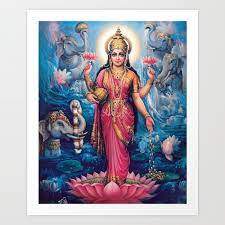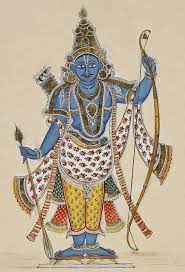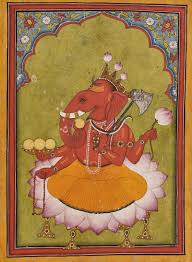
Goddess Lakshmi: Symbol of Wealth and Prosperity
Goddess Lakshmi, the Hindu goddess of wealth, fortune, and prosperity, occupies a central place in Hindu mythology, culture, and spirituality. Her name itself, "Lakshmi," means "aim" or "goal," signifying her role in guiding humanity towards prosperity and abundance. In this blog, we will delve into the significance, symbolism, and worship of Goddess Lakshmi and explore the enduring fascination with her divine presence.
The Symbolism of Goddess Lakshmi

-
Wealth and Prosperity: As the goddess of wealth, Goddess Lakshmi represents material and financial abundance. Her blessings are sought by devotees to attain material comfort and financial well-being.
-
Spiritual Prosperity: Lakshmi's significance extends beyond the material realm. She is also associated with spiritual prosperity, inner peace, and the pursuit of righteousness (dharma).
-
Fortune and Luck: Lakshmi is often depicted holding a lotus flower, symbolizing purity and detachment. The lotus also represents fortune, beauty, and the unfolding of spiritual potential.
-
Divine Beauty: Lakshmi is described as exceptionally beautiful, radiating a divine aura of grace and elegance. Her beauty signifies the attractiveness of virtuous qualities.
-
Lotus Seat: The goddess is often shown seated on a lotus flower, representing purity and transcendence over material desires.
Lakshmi's Iconography

Goddess Lakshmi is typically depicted with several key attributes:
-
Four Arms: She is often portrayed with four arms, symbolizing her omnipresence and her ability to bestow blessings from all directions.
-
Lotus: As mentioned earlier, the lotus is a prominent symbol associated with Lakshmi, symbolizing purity, beauty, and transcendence.
-
Gold Coins: Lakshmi may be shown pouring gold coins from one of her hands, representing her bestowal of wealth and financial prosperity.
-
Elephant: In some depictions, an elephant is seen pouring water over the goddess, signifying the purity and abundance of her blessings.
Lakshmi's Worship and Festivals

The worship of Goddess Lakshmi is an integral part of Hindu culture, and there are several festivals dedicated to her, with the most prominent one being Diwali, the Festival of Lights. During Diwali, devotees clean and decorate their homes, light oil lamps, and offer prayers to Lakshmi to invite her blessings of prosperity and well-being into their households.
In South India, a festival called "Varalakshmi Vratam" is observed, where women worship Goddess Lakshmi for the well-being of their families and the prosperity of their homes.
Lakshmi is also associated with the annual "Navaratri" festival, where her blessings are sought during the nine nights of worship, symbolizing the triumph of good over evil.
Conclusion
Goddess Lakshmi stands as a symbol of wealth, prosperity, and spiritual well-being in Hinduism. Her significance goes beyond the mere accumulation of material riches; she embodies the idea that true wealth encompasses both the external and internal aspects of life. Devotees turn to her to seek not just financial abundance but also inner peace, virtue, and the pursuit of righteousness. The worship of Goddess Lakshmi serves as a reminder that prosperity, when attained with purity of heart and a sense of responsibility, can lead to a life filled with harmony and contentment.

